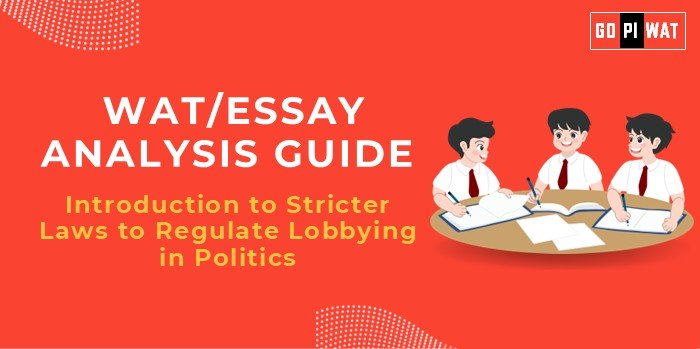📋 Written Ability Test (WAT)/Essay Analysis Guide
🌐 Understanding the Importance of Regulating Lobbying
🔍 Introduction to the Topic
Lobbying directly affects policymaking, governance, and public trust, making it a critical subject for analysis. For B-school aspirants, it represents a blend of ethics, public policy, and corporate governance.
📅 Effective Planning and Writing
- 🕒 Time Allocation: Planning (5 mins), Writing (20 mins), Reviewing (5 mins).
- 📖 Preparation Tips: Note key statistics and stakeholder roles to build a robust argument.
💡 Introduction Techniques for Essays
- ⚖️ Contrast Approach: “While lobbying ensures stakeholder representation, the absence of regulation in India raises significant ethical concerns.”
- 🔧 Solution-Based Approach: “Stricter laws for lobbying could bridge the trust gap in governance, ensuring accountability and fairness.”
🛠️ Structuring the Essay Body
- 🏆 Achievements: Highlight economic facilitation and policy dialogue benefits.
- ⚠️ Challenges: Focus on corruption risks, lack of regulation, and global benchmarks.
- 🔮 Future Outlook: Suggest potential reforms like mandatory disclosures and adopting global best practices.
📝 Concluding Effectively
- ⚖️ Balanced Perspective: “Lobbying is indispensable in modern governance, but without stricter laws, its potential is undermined by risks of corruption.”
- 🌍 Global Comparison: “India can learn from global frameworks like Canada’s Lobbying Act to create a transparent and ethical system.”
🔍 Recommendations for Sustainable Progress
- 📊 Mandatory Disclosures: Require public reporting of lobbying activities.
- 🛡️ Ethical Oversight Bodies: Establish independent regulatory bodies.
- 🤝 International Collaboration: Benchmark against countries with robust systems.
🖋️ Sample Short Essays
✨ Balanced Perspective:
“Lobbying is a crucial part of governance, bridging gaps between stakeholders and policymakers. However, without a legal framework, it risks becoming a tool for corruption. India must adopt stricter laws to ensure ethical practices, learning from global examples.”
💡 Solution-Oriented:
“Stricter lobbying laws can address India’s governance challenges, enhancing transparency and public trust. By introducing mandatory disclosures and oversight bodies, the government can strike a balance between regulation and dialogue.”
🌍 Global Comparison:
“India’s unregulated lobbying contrasts sharply with Canada’s transparent model. Stricter laws, inspired by such frameworks, can make lobbying ethical, fostering a robust democracy.”


